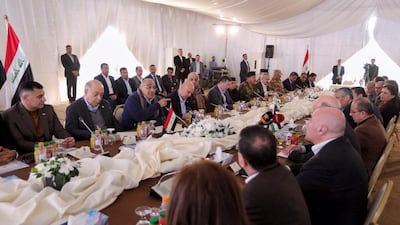Jordan and Iraq signed energy, trade, transport and industrial agreements in addition to joint projects to revive economic ties between the two neighbours to the highest point in over two decades.
In what is being billed as a "renaissance" of Jordanian-Iraqi ties, Jordan's Prime Minister Omar Razzaz and Iraqi Prime Minister Adel Abdul Mahdi concluded the agreements on Saturday. Iraqi oil supplies to Jordan will resume after years of suspension and trade between the two will ease.
As part of the deals, Iraq will provide Jordan, which imports more than 90 per cent of its energy needs, with 10,000 barrels of crude per day from Kirkuk to be transported by truck at preferential prices, according to the state-run
Petra news agency.
The two countries also agreed to link their electricity grids, ordering technical studies to allow Jordan to export up to 300 megawatts of electricity to Iraq by late 2020.
Amman and Baghdad also launched technical studies for the construction of a long-discussed 1,700 kilometre oil pipeline from Basra to the coastal Red Sea city of Aqaba. That will help Iraq diversify its oil export means and allow Jordan to import crude directly.
Jordan and Iraq also agreed on a “door-to-door” freight shipping accord, under which cargo trucks will go through the shared borders, unimpeded and reach their final destination, saving both time and money for exporters and importers in Iraq and Jordan.
Previously, truck shipments from Jordan bound for Iraq were unloaded and moved to trucks waiting on the other side of the border, while Iraqi trucks faced strict security procedures and permits on the Jordanian side.
The centrepiece of the agreements is a joint Jordanian-Iraqi industrial zone, a special economic zone for manufacturing and production under which Iraqi goods with Jordanian input, benefit from tariff exemptions under free trade agreements the latter has with several countries. Jordan has donated 200 hectares for the project, on a yet-undisclosed location within the kingdom, expandable upto 1,000 hectares. The country expects a similar allocation from the Iraqi side, according to a Jordanian government statement.
The industrial zone has the potential to create "several thousand" jobs for both Iraqis and Jordanians in areas ranging from manufacturing to the production of solar panels and help Iraqi goods access a billion consumers, said sources in the Jordanian government.
To boost trade, Jordan has also agreed to reduce administrative and handling fees on Iraqi goods entering the kingdom’s Red Sea port of Aqaba by 75 per cent and grant facilities specifically for Iraqi goods at Aqaba.
In return, the Iraqi government enforced a previous agreement to exempt 393 Jordanian products from customs fees.
The agreements come weeks after the visit of Jordan's King Abdullah to Baghdad on January 14, which kick-started a warming of diplomatic ties between the neighbouring countries.
The two nations did a land trade of over 1 billion Jordanian dinar (Dh5.2bn) annually, which had dropped to JD300 million as of 2015 due to security restrictions and closure of their shared land borders due to the rise of ISIS from 2014 to 2017.
Despite the reopening of borders, both Iraqi and Jordanian businessmen, investors and truck owners have complained to their respective governments of restrictions preventing smooth passage of goods, passengers and medical tourists between the two countries.
Prior to the 2003 Iraq war, Jordan was fully dependent on Iraq for oil, receiving more than 5.5 million tonnes per year either free or at preferential rates.

